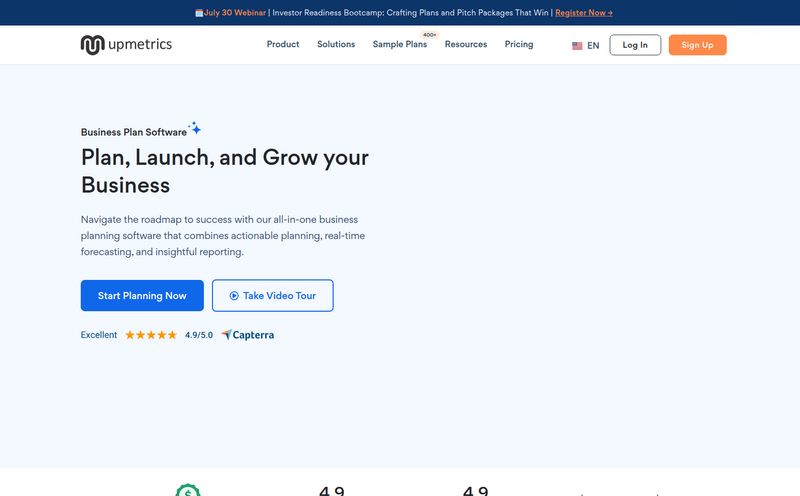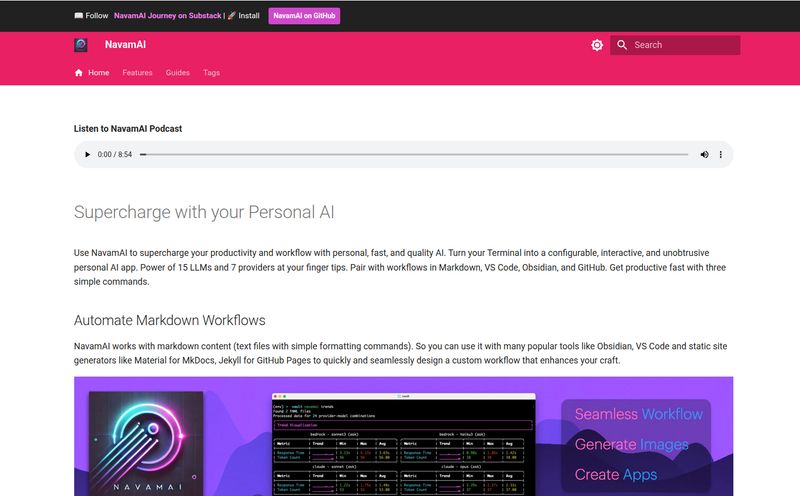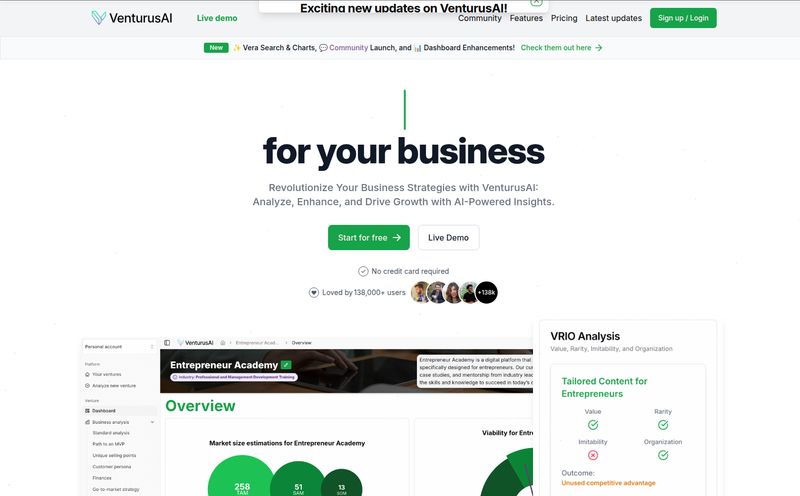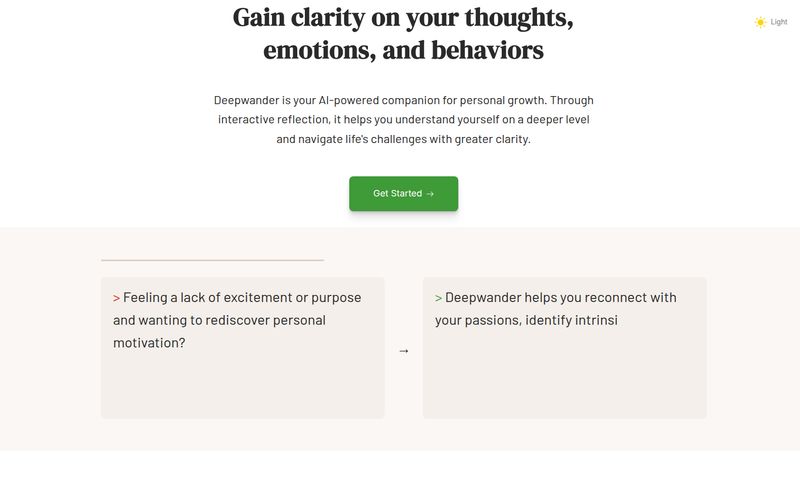We’ve all been there. It’s 2 AM, you can’t sleep, and suddenly it hits you—the million-dollar idea. It’s brilliant. It’s disruptive. It’s… a bunch of scribbles on a napkin by morning. The initial spark of genius quickly gets smothered by a tidal wave of questions. Who are my customers? Is the market big enough? How do I even start? How much will it cost? The sheer overwhelm is enough to send that brilliant idea straight to the graveyard of “someday” projects.
I’ve seen it a dozen times, both with my own half-baked concepts and with bright-eyed founders I’ve worked with over the years. The gap between a great idea and a viable business is a chasm filled with market research, financial projections, and strategic planning. It's a slog. For years, the options were either to grit your teeth and do it all yourself (hello, 80-hour weeks) or hire expensive consultants. Then AI came along, promising to change everything. But a blank chat window in ChatGPT can feel just as intimidating as a blank business plan template.
That's where a tool like FoundrAI waltzes in. It claims to be an “All-In-One Startup Strategy Co-Pilot.” Big words. I’m naturally skeptical of anything that promises to make the startup grind easy, because it’s not. But a tool that makes it more structured and less chaotic? Now you have my attention. I decided to take a look under the hood and see if it's really the guide founders need or just another fancy AI gimmick.
What Exactly is FoundrAI? (And Why It's Not Just Another ChatGPT Wrapper)
Let's get one thing straight right away. My biggest fear was that this would just be a slick interface slapped on top of an OpenAI API. You type in a prompt, it spits out generic advice. I was pleasantly surprised to find that’s not really the case here.
FoundrAI is less of a chatbot and more of a structured, guided workspace. Think of it like this: ChatGPT is a brilliant, all-knowing person you can ask anything. But they have no context for your project and you have to ask the perfect questions to get what you need. FoundrAI, on the other hand, is like a seasoned startup mentor who sits down with you, pulls out a whiteboard, and says, “Okay, let's start with your idea. Now, let’s validate it. Next, let's define your customer.” It guides you through a proven process.
The platform uses what it calls AI agents, each trained for a specific part of the startup journey—validation, customer research, Go-to-Market (GTM) strategy, and so on. It’s the difference between being handed a box of Lego bricks versus being given the instruction manual for building the Millennium Falcon. Both use the same bricks, but one gets you to a finished product a heck of a lot faster.
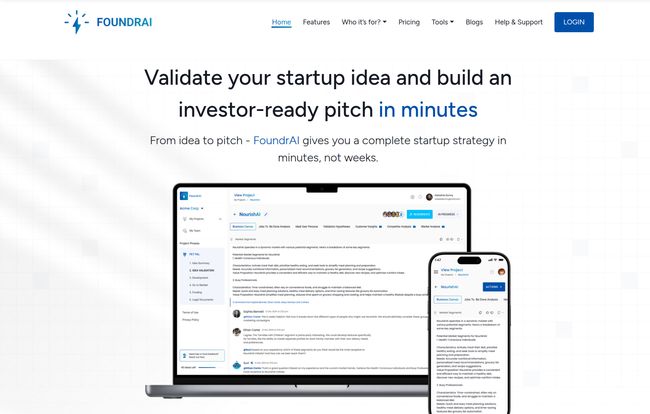
Visit FoundrAI
The website itself has a handy comparison chart against doing it yourself or using ChatGPT. Manually, it’s slow and you're prone to bias. With ChatGPT, it’s faster but often generic and lacks a coherent structure. FoundrAI aims for that sweet spot: expert-level structure combined with AI speed. It’s an ambitious goal, but from what I see, they're on the right track.
The Core Features That Actually Matter for Founders
A platform can have all the bells and whistles in the world, but if they don't solve real problems, they're just noise. I zoned in on the features that address the biggest pain points I see founders struggle with.
From "Is This a Dumb Idea?" to Validated Concept
How much time and money have been wasted on ideas that were dead on arrival? Too much. FoundrAI’s AI-Powered Idea Validation is probably its most critical feature. You plug in your concept, and the AI stress-tests it. It forces you to think about the problem you’re solving, the uniqueness of your solution, and potential roadblocks. It’s like having a brutally honest friend who isn't afraid to tell you your baby is ugly. And sometimes, you need that before you spend thousands on a nursery.
Finding Your People: AI-Generated Personas and JTBD
“We’re targeting everyone” is the fastest way to target no one. Every marketer knows this. The hard part is building those detailed customer personas. FoundrAI automates this, generating user personas and, more importantly, digging into their Jobs To Be Done (JTBD). If you're not familiar with the JTBD framework, it’s a game-changer. It focuses on the ‘job’ a customer is ‘hiring’ your product to do. This simple shift in perspective is gold for both marketing and product development, and having an AI to help brainstorm these angles is incredibly useful.
Sizing Up the Pie: Market Analysis and TAM/SAM/SOM
Ah, TAM/SAM/SOM. The three acronyms that make every founder groan and every investor lean in. Calculating your Total Addressable Market, Serviceable Available Market, and Serviceable Obtainable Market is tedious, mind-numbing work. It involves digging through market reports, census data, and industry analyses. FoundrAI automates this estimation. Is it going to be as perfectly precise as a $20,000 report from Gartner? Probably not. But for an early-stage startup that needs a solid, data-backed estimation for a pitch deck, it’s an absolute lifesaver.
Planning Your Attack: The Go-To-Market (GTM) Strategy
Okay, so your idea is validated, you know your customer, and the market is big enough. How do you actually reach them? FoundrAI helps build out a GTM and pricing strategy. It analyzes competitors and suggests channels and tactics. Again, this isn't a replacement for strategic thinking, but it’s an incredible starting point that saves you from the terror of the blank page.
Let's Talk Money: FoundrAI Pricing Breakdown
Alright, the all-important question. What’s this going to cost me? The pricing structure is pretty straightforward and seems designed to grow with a startup. They offer both monthly and yearly plans, with a nice discount if you pay annually.
Here’s a quick rundown of their monthly plans:
- Kindling (Free): This is for the absolute beginner. You get one user license and can generate up to 40 ideas a day. You don't get the deep analysis features like validation, persona generation, or GTM strategy, but it’s a great way to play with the platform and see if you like the feel of it. A no-risk entry point.
- Spark ($25/month): Aimed at solo builders. This unlocks most of the core features we just talked about: Business Canvas, Blue Ocean Analysis, Persona Generation, Validation, GTM, and more. For a single founder trying to get organized, this seems like the sweet spot.
- BLAZE ($59/month): For small, growing startups. You get 3 user licenses, so you and your co-founders can collaborate within the platform. You get everything in Spark, plus priority support.
- Inferno ($189/month): This is for larger founder teams or even small agencies. It bumps you up to 10 user licenses and adds a dedicated account manager.
The pricing feels fair for the value, especially when you compare it to the cost of your own time or hiring outside help. The $25 Spark plan, in particular, seems like a pretty small investment for the amount of structure and clarity it could bring.
The Good, The Bad, and The AI-Reliant
No tool is perfect. After spending time with it, here are my unfiltered thoughts.
What I Like
The structure is the number one win for me. It’s the platform’s biggest differentiator. It takes the chaotic, non-linear process of building a business and puts it on rails. This dramatically lowers the activation energy needed to get started. The automation of tedious research like TAM/SAM/SOM is a close second. And the collaboration tools in the higher tiers are a thoughtful touch for growing teams.
What Gives Me Pause
First, it's a subscription. Another one. For a boot-strapped founder, every dollar counts. You have to be confident it's providing more value than it costs. Second, and this is more of a philosophical point, is the reliance on AI. The provided list of cons mentions this, and it's a valid concern. It’s easy to see how someone could just blindly accept the AI’s output without applying their own critical thought and intuition. My advice? Use it as a co-pilot, not an autopilot. Let it do the heavy lifting on research and provide drafts, but you still have to fly the plane. Don't let it replce your unique human insight; that's your real competitive advantage.
My Final Verdict: Is FoundrAI Worth It?
So, what’s the bottom line? Yes, for the right person, FoundrAI is absolutely worth it.
This tool is tailor-made for early-stage founders, solopreneurs, and anyone who feels overwhelmed by the 'business' side of their business idea. If you’re a builder, a creator, or a visionary who groans at the thought of building spreadsheets and market research reports, this could be the thing that keeps you on track. It's also a fantastic tool for agencies or consultants who manage multiple startup projects and need to standardize their strategic process.
Who is it not for? If you're a seasoned entrepreneur with your own well-established systems for validation and planning, you might find it too restrictive. If you're a business that's already well past the idea stage and into scaling, your needs have probably outgrown this.
But for those standing at the base of the mountain, looking up at the daunting climb ahead, FoundrAI is a pretty compelling sherpa. It won't carry you to the top, but it will give you a map, point out the crevasses, and make sure you’ve packed the right gear. And sometimes, that's all you need to take the first step.
Frequently Asked Questions about FoundrAI
- Can FoundrAI replace a human business consultant?
- No, and it's not meant to. It’s a tool to augment your own skills and provide structure. A human consultant can offer bespoke advice, network connections, and accountability that an AI can't. FoundrAI is best seen as a way to do your homework and prepare, making any time with a human consultant far more productive.
- How is FoundrAI different from just using ChatGPT-4?
- The key difference is structure. ChatGPT is a general-purpose tool that requires you to know what to ask. FoundrAI is a specialized platform that guides you through a proven startup methodology, from validation to GTM, ensuring you don't miss critical steps.
- Is the free "Kindling" plan useful?
- It's useful as a trial. It lets you get a feel for the interface and use the AI for basic idea generation. However, to get the real strategic value—the validation, persona analysis, and GTM planning—you'll need to upgrade to a paid plan like Spark.
- What is TAM/SAM/SOM and why does it matter?
- They stand for Total Addressable Market, Serviceable Available Market, and Serviceable Obtainable Market. In simple terms, it's a way of narrowing down the entire potential market to the realistic slice your startup can capture. It's crucial for convincing investors (and yourself) that there's a real business opportunity.
- Does FoundrAI write my entire business plan?
- It provides all the core components and structured data you would need to assemble a comprehensive business plan or an investor pitch deck very quickly. It generates the market analysis, customer profiles, GTM strategy, etc., but you'll still be the one to weave it all together into a final document.
Reference and Sources
- FoundrAI Official Website
- FoundrAI Pricing Page
- Harvard Business Review on the Jobs To Be Done Framework
